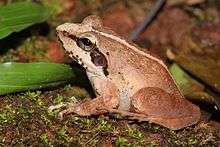Indirana chiravasi
| Amboli leaping frog | |
|---|---|
 | |
| Scientific classification | |
| Kingdom: | Animalia |
| Phylum: | Chordata |
| Class: | Amphibia |
| Order: | Anura |
| Family: | Ranixalidae |
| Genus: | Indirana |
| Species: | I. chiravasi |
| Binomial name | |
| Indirana chiravasi Padhye, Modak, and Dahanukar, 2014[1] | |
Indirana chiravasi (common name: Amboli leaping frog) is a species of frog endemic to the Western Ghats of India. It is only known from its type locality, the laterite plateaus by the hill-station of Amboli, Maharashtra.[2][3] It was described in 2014 by a team of three scientists from IISER, Pune and MES Abasaheb Garware College.[3]

Description
Males measure 25–27 mm (0.98–1.06 in) and females 32–39 mm (1.3–1.5 in) in snout–vent length. The skin is smooth except on the sides that are granular; there are few longitudinal folds on dorsal side. Dorsal colour is olive brown with scattered yellow markings and, in males only, densely organized black spots comprising a W-shaped marking. There is a black strip running from tip of snout to shoulder through eye and tympanum. The fingers are unwebbed whereas the toes are moderately webbed.[1]
Habitat
Indirana chiravasi inhabit lateritic rocky outcrops and occur in a variety of microhabitats. They are often found in the crevices of the laterite boulders; males are mostly seen while calling from the wet rocks or moss-covered boulders. Females have been found under a log in the forest and from under a roadside stone. The tadpoles are terrestrial and have been observed feeding on algal matter on wet boulders.[1]
References
- 1 2 3 Padhye, A. D.; Modak, N.; Dahanukar, N. (2014). "Indirana chiravasi, a new species of Leaping Frog (Anura: Ranixalidae) from Western Ghats of India". Journal of Threatened Taxa. 6 (10): 6293. doi:10.11609/JoTT.o4068.6293-312.
- ↑ Frost, Darrel R. (2016). "Indirana chiravasi Padhye, Modak, and Dahanukar, 2014". Amphibian Species of the World: an Online Reference. Version 6.0. American Museum of Natural History. Retrieved 27 August 2016.
- 1 2 "Pune scientists find new frog species near Amboli". Times of India. Oct 1, 2014. Retrieved 9 October 2014.